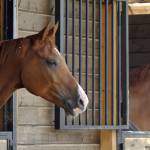Healthy Microbiome, Happy Horse

Improving the understanding of the equine intestinal microbiome has been a focus among researchers for many years. Among the many questions researchers ask, perhaps the most intriguing is the effect of the microbiome on a horse’s mental status.*
Studies demonstrate a direct link between the microbiota in the gastrointestinal tract and the brain, called the gut-brain axis. This axis can be influenced either positively or negatively through diet.
In horses with an “unhealthy” gastrointestinal tract, such as stabled horses without free-choice access to forage, shifts in the makeup of their microbiota occur. As a result, mental health may suffer, potentially manifesting as stereotypic behaviors, such as cribbing and weaving, or aggressive behaviors such as biting and kicking. In fact, some experts assert that if horses were fed like undomesticated horses, with 24-hour group turnout and access to forage, plus limited high-calorie offerings, fewer behavioral issues would occur due to a healthier gut-brain axis.
“In reality, it is not possible to maintain all domesticated horses on forage-only diets with unlimited pasture turnout. This is particularly true for sport horses that require additional calories that cannot be provided through forage alone,” explained Kathleen Crandell, Ph.D., a nutritionist for Kentucky Equine Research.
“Offering a research-proven hindgut buffer like EquiShure can help maintain an appropriate pH in the hindgut during times of stress or when adding concentrates to a forage-based diet,” she said. “The microorganisms that make up the microbiome function best at a specific pH. If the acidity level in the intestinal tract is altered, feed utilization and the horse’s welfare can suffer.”
As an extension of the basic gut-brain axis described above, the existence of a more intricate microbiota-gut-brain axis could play an important role in mental and physical health, and therefore equine welfare, than originally suspected.
*Mach, N., A. Ruet, A. Clark, D. Bars-Cortina, Y. Romayo-Calder, E. Crisci, S. Pennarun, S. Dhorne-Pollet, A. Foury, M. Moisan, and L. Lansade. 2020. Priming for welfare: Gut microbiota is associated with equitation conditions and behavior in horse athletes Scientific Reports 10(1):8311.








